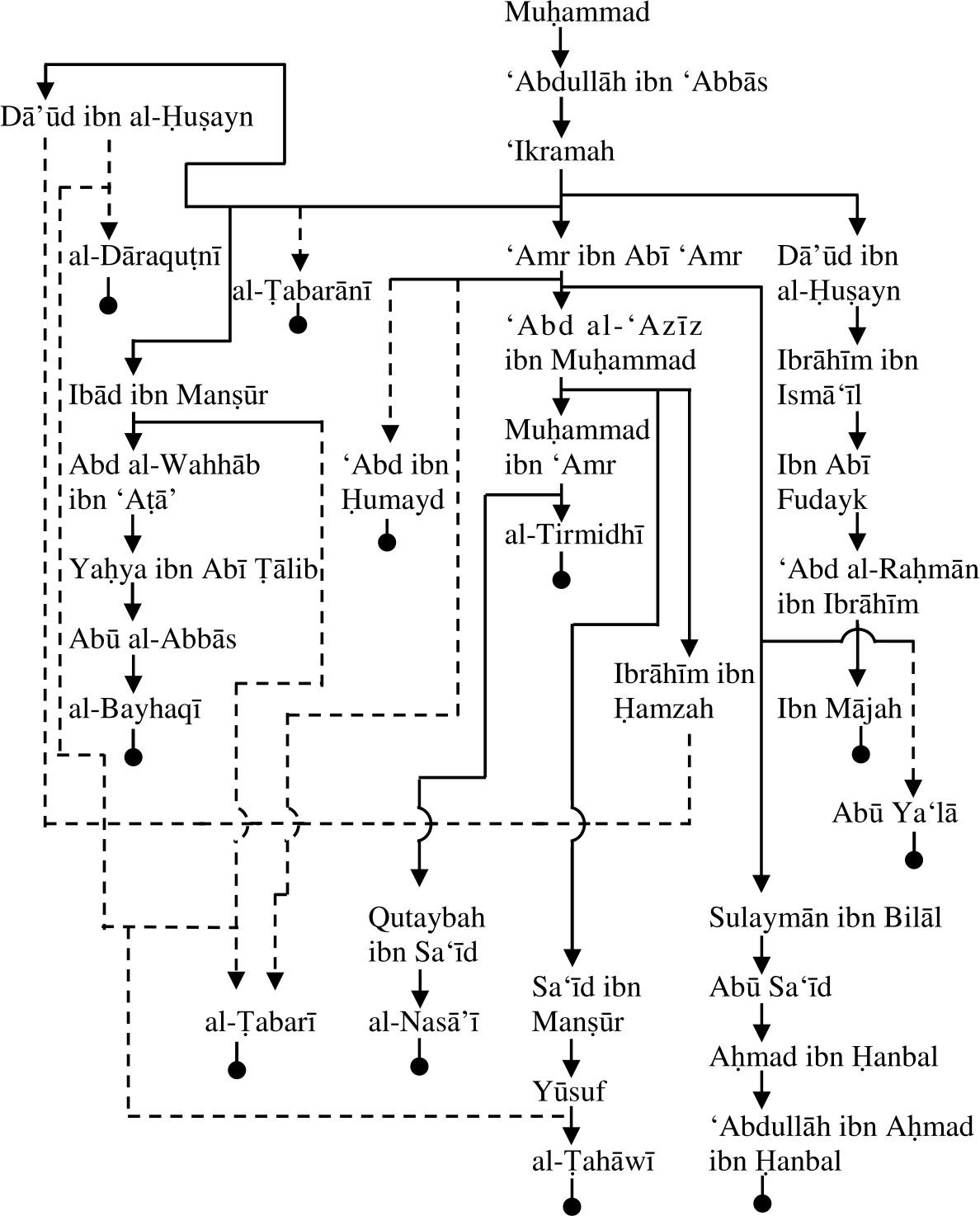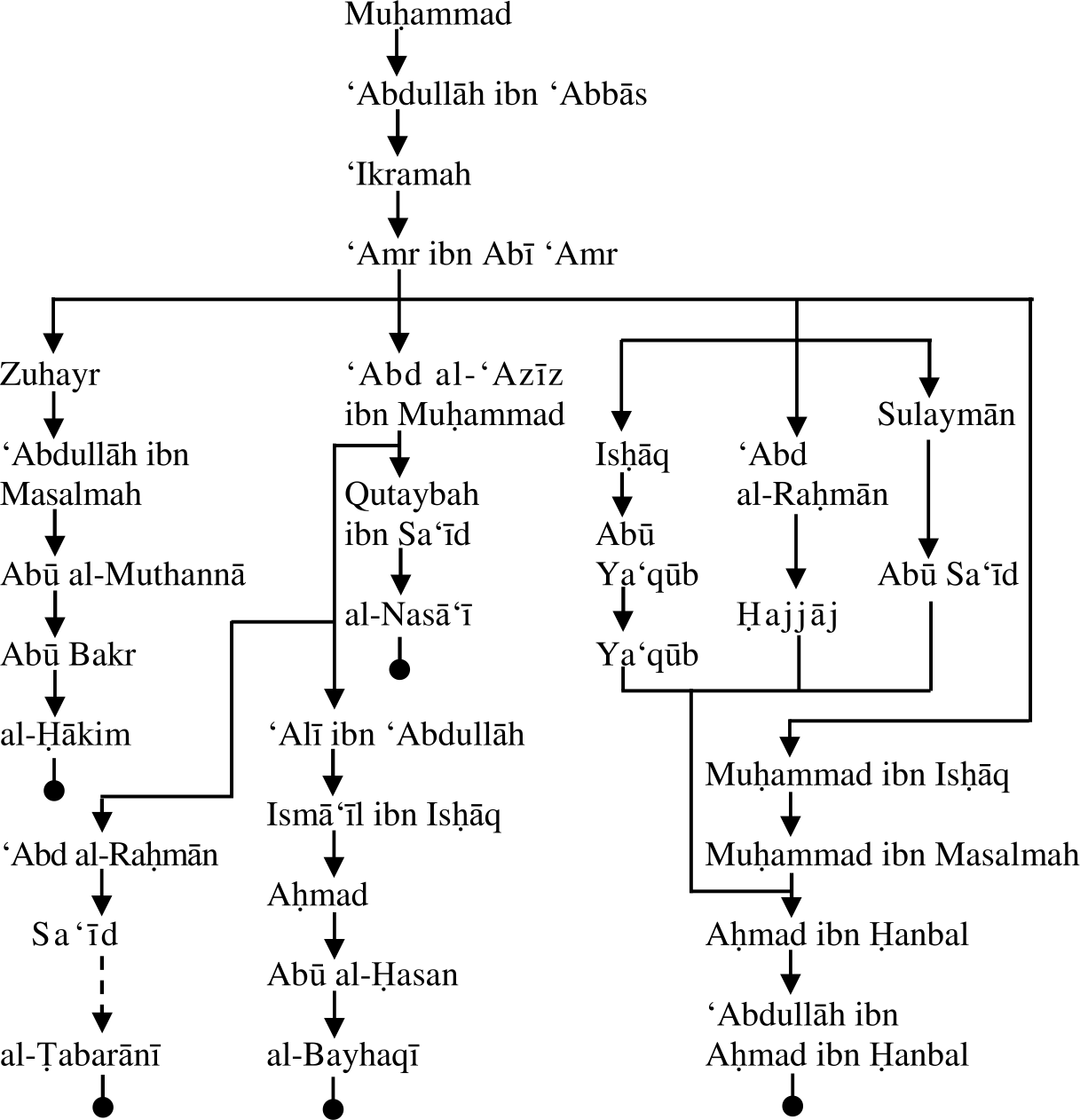حدثنا محمد
بن عَمْرٍو السَّوَّاقُ حدثنا عبد الْعَزِيزِ بن مُحَمَّدٍ عن
عَمْرِو بن أبي عَمْرٍو عن عِكْرِمَةَ عن بن عَبَّاسٍ قال قال
رسول اللَّهِ صلي الله عليه وسلم من وَجَدْتُمُوهُ وَقَعَ علي
بَهِيمَةٍ فَاقْتُلُوهُ وَاقْتُلُوا الْبَهِيمَةَ فَقِيلَ لابن
عَبَّاسٍ ما شَأْنُ الْبَهِيمَةِ قال ما سمعت من رسول اللَّهِ
صلي الله عليه وسلم في ذلك شيئا وَلَكِنْ أَرَى رَسُولَ اللَّهِ
كَرِهَ أَنْ يُؤْكَلَ من لَحْمِهَا أو يُنْتَفَعَ بها وقد عُمِلَ
بها ذلك الْعَمَلُ قال أبو عِيسَي هذا حَدِيثٌ لَا نَعْرِفُهُ
إلا من حديث عَمْرِو بن أبي عَمْرٍو عن عِكْرِمَةَ عن بن
عَبَّاسٍ عن النبي صلي الله عليه وسلم وقد رَوَى سُفْيَانُ
الثَّوْرِيُّ عن عَاصِمٍ عن أبي رُزَيْنٍ عن بن عَبَّاسٍ أَنَّهُ
قال من أتي بَهِيمَةً فلا حَدَّ عليه حدثنا بِذَلِكَ محمد بن
بَشَّارٍ حدثنا عبد الرحمن بن مَهْدِيٍّ حدثنا سُفْيَانُ
الثَّوْرِيُّ وَهَذَا أَصَحُّ من الحديث الْأَوَّلِ وَالْعَمَلُ
علي هذا عِنْدَ أَهْلِ الْعِلْمِ وهو قَوْلُ أَحْمَدَ وإسحاق
‘Abdullah ibn ‘Abbas stated that God’s Messenger said: “He who
you find has committed sex with an animal kill him as well as
the animal.” When Ibn ‘Abbas was asked the reason for killing
the animal, he replied: “I have not heard anything in this
regard from God’s Messenger; what have seen is that God’s
messenger disliked the meat of such an animal being eaten or
some other benefit be taken from the animal and the practice
has persisted on this view.” Al-Tirmidhi stated: “We only know
this narrative from ‘Amr ibn Abi ‘Amr reporting it from
‘Ikramah from Ibn ‘Abbas from the Prophet. and Sufyan al-Thawri
has reported it from ‘Āsim from Abu Razin from Ibn ‘Abbas that
there is not punishment for this act. This has been narrated
to us from Muhammad ibn Bashshar who has narrated from ‘Abd
al-Rahman ibn Mahdi who has narrated from Sufyan al-Thawri,
This narrative is more correct than the previous one and men
of learning follow it and this is also the opinion of Ahmad
and Ishaq.”
Following is
the schematic illustration of the isnad of this narrative’s
variants:

Abu Hatim says
that it is munkar narrative.
We find the
following jarh on ‘Ikramah:
حدثنا الحسن بن علي ومحمد بن أيوب قالا حدثنا
يحيی بن المغيرة قال حدثنا جرير عن يزيد بن زياد عن عبد الله بن
الحارث قال دخلت علی علي بن عبد الله بن عباس فإذا عكرمة في وثاق
عند باب الحسن فقلت له ألا تتقي الله قال فإن هذا الخبيث يكذب
علی أبي
‘Abdullah ibn al-Harith said: “I came to
‘Ali ibn ‘Abdullah ibn ‘Abbas and found that ‘Ikramah was
chained near the door of Hasan. So I said to him: ‘Do you not
fear God?’ He replied: ‘This is because this hideous person
fabricates lies about my father.’”
Following is
what al-Mizzi has recorded about ‘Amr ibn Abi ‘Amr:
Yahya ibn Ma‘in
fi hadithihi da‘if laysa bi al-qawi laysa bi hujjah; another
opinion ascribed to him is laysa bi dhak al-qawi and still
another is da‘if; al-Bukhari says that he does not know if
heard the bestiality punishment from ‘Ikramah or not; Abu
Da’ud says that he is laysa huwa bi dhak; al-Nasa’i says that
he is laysa bi al-qawi. Ahmad ibn Hanbal says laysa bihi ba’s;
Abu Hatim says la ba’sa bihi and Abu Zur‘ah says that he is
thiqah.
Al-‘Ijli says
that he is thiqah yunkirul ‘alayh hadith al-bahimah.
Ibn ‘Adi
records: Malik regards him to be weak and al-Sa‘di says that
he is mudtarib al-hadith.
Al-Juzjani says
that he is mudtarib al-hadith.
Ahmad says that
all narratives reported by ‘Ikramah have discrepancies.
It may be noted that the following variants
of the narratives reported by similar chains do not mention
the killing of the person who committed bestiality as well of
the animal itself. They only mention that such a person is
cursed by God:
أخبرنا قتيبة بن سعيد قال ثنا عبد العزيز
عن عمرو عن عكرمة عن بن عباس أن رسول الله صلى الله عليه وسلم
قال لعن الله من وقع على بهيمة
‘Abdullah ibn ‘Abbas reported that God’s
Messenger said: “God has cursed the person who commits
bestiality.”
Following is
the schematic illustration of the isnad of this narrative’s
variants:

Moreover, as
pointed out by al-Tirmidhi in the text of the narrative that
‘Abdullah ibn ‘Abbas’ (rta) own view was that such an act does
not entail any punishment for the perpetrator.
Authorities opine that he could never have given a view
against that of the Prophet (sws).
Abu Da’ud is of the view that this narrative actually weakens
the main narrative.
__________
|